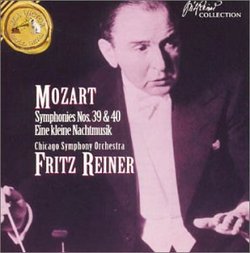| All Artists: Mozart, Reiner, Cso Title: Mozart: Symphony 39 / Symphony 40 / Eine Kleine Nachtmusik (Serenade K.525) Members Wishing: 0 Total Copies: 0 Label: RCA Release Date: 1/10/1995 Genre: Classical Styles: Forms & Genres, Serenades & Divertimentos, Historical Periods, Classical (c.1770-1830), Symphonies Number of Discs: 1 SwapaCD Credits: 1 UPC: 090266258529 |
Search - Mozart, Reiner, Cso :: Mozart: Symphony 39 / Symphony 40 / Eine Kleine Nachtmusik (Serenade K.525)
 | Mozart, Reiner, Cso Mozart: Symphony 39 / Symphony 40 / Eine Kleine Nachtmusik (Serenade K.525) Genre: Classical
|
Larger Image |
CD Details |
CD ReviewsGreat performances of familiar Mozart pieces! 04/21/1999 (5 out of 5 stars) "Most people associate Reiner as a specialist in performances of Richard Strauss and Wagner. But he was equally phenomenal as a performer of Mozart's symphonies, operas, and miscellaneous orchestral works. Reiner's Romantic-era orchestral approach to performing Mozart will not meet with the approval of the original instruments camp, but they cannot for one minute question his clarity, enunciation, and charm in performing these pieces.While most of Reiner's Mozart recorded in Chicago was mono with the exception of the 41st Symphony and the Don Giovanni overture in stereo, the lack of stereo sound on this CD should not in any way deter its purchase. Buy with confidence to hear how unique and different Reiner made Mozart sound, compared to other conductors." Reiner's Mozart kreisleriana16 | Minneapolis, MN USA | 05/28/2000 (4 out of 5 stars) "It has only been in the last few decades that Mozart symphonies are being played (along with Beethoven, Bramhs, etc.) the proper way with full repeats. During the time the Reiner Mozart Symphonies were recorded the obligatory repeat of the exposition was generally omitted. I suspect that this tradition was, in part, due to limited recording times of the old 78 records as well as an apparant tradition that dated back for one reason or another in the 19th century. Unless I am wrong it was Benjamin Britten's recording of some of the late Mozart Symphonies that included every note. Suddenly these works became 35 to 40 minute symphonies.Of course we also must not forget that during Mozart's time it was customary to play a few movements of a symphony, add some songs, a concerto, a divertimento or whatever before the rest of the symphony would be performed.Does this mean that the Reiner/CSO recordings should be less than ideal? No. They represent at best the tradition of the time they were recorded. They also represent the clarity and precision that Reiner was able to extract from the CSO even though they were recorded during the first part of his tenure.Tempos may seem a little fast for some. At that time, however, the violins were still placed with the first violins on one side of the stage, the seconds on the other side. The 39th and 40th came from a set that also included the 36th and 41st Symphonies. That set became very difficult to find. Were it not for the German RCA set I would still be without the performances. For those listeners who associated Reiner with the likes of Richard Struass they are in for a big surprise when they listen to either his Mozart or his Beethoven.For those who wish to listen to Mozart as performed during the mid 20th century either the Reiner/CSO recordings or the Beecham examples are outstanding as are the Bruno Walter performances on American Columbia made in the early 1960's."
|

 Track Listings (12) - Disc #1
Track Listings (12) - Disc #1